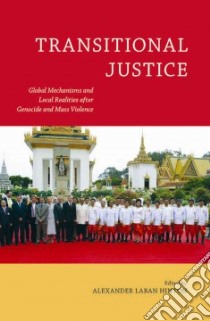Transitional Justice - 9780813547619
Un libro in lingua di Hinton Alexander Laban (EDT) Bleeker Mo (FRW) Wagner Sarah (CON) Drexler Elizabeth F. (CON) Sanford Victoria (CON) edito da Rutgers Univ Pr, 2010
- € 39.50
- Il prezzo è variabile in funzione del cambio della valuta d’origine
"This superb collection of essays illustrates well the messiness that underlies the evolving concept of transitional justice. By casting an anthropological eye on the real world of local justice---on the ground and buffeted by history, politics, globalized discourse, rituals, and power relationships---this volume makes an important contribution to our understanding of transitional justice and, in particular, the assumptions that have framed its initiation and development. Most importantly, these essays raise the critical question of whether we have limited our perspectives prematurely and accepted too restrictive a definition of the field." ---Harvey M. Weinstein, coeditor-in-chief, International Journal of Transitional Justice
"Transitional justice offers great promise of reconciling past wrongs and conflicts, but we know relatively little about its local effects. This excellent anthropological collection gives a rich and complex story of how it works in practice." ---Sally Engle Merry, New York University
A volume in the Genocide, Political Violence, Human Rights series, edited by Alexander Laban Hinton, Stephen Eric Bronner, and Nela Navarro
How do societies come to terms with the aftermath of genocide and mass violence, and how might the international community contribute to this process? Recently, transitional justice mechanisms such as tribunals and truth commissions have emerged as a favored means of redress. Transitional Justice, the first edited collection in anthropology focused directly on this issue, argues that, however well-intentioned, transitional justice needs to grapple more deeply with the complexities of global and transnational involvements and the local on-the-ground realities with which they intersect.
Contributors consider what justice means and how it is negotiated in different localities where transitional justice efforts are under way after genocide and mass atrocity. They address a variety of mechanisms, among them a memorial site in Bali, truth commissions in Argentina and Chile, First Nations treaty negotiations in Canada, and Gacaca courts in Rwanda.
Informazioni bibliografiche
- Titolo del Libro in lingua: Transitional Justice
- Sottotitolo: Global Mechanisms and Local Realities After Genocide and Mass Violence
- Lingua: English
- Autori : Hinton Alexander Laban (EDT) Bleeker Mo (FRW) Wagner Sarah (CON) Drexler Elizabeth F. (CON) Sanford Victoria (CON)
- Editore: Rutgers Univ Pr
- Collana: Rutgers Univ Pr (Hardcover)
- Data di Pubblicazione: 15 Luglio '10
- Genere: POLITICAL SCIENCE
- Argomenti : Transitional justice Crimes against humanity
- Pagine: 271
- ISBN-10: 081354761X
- EAN-13: 9780813547619


